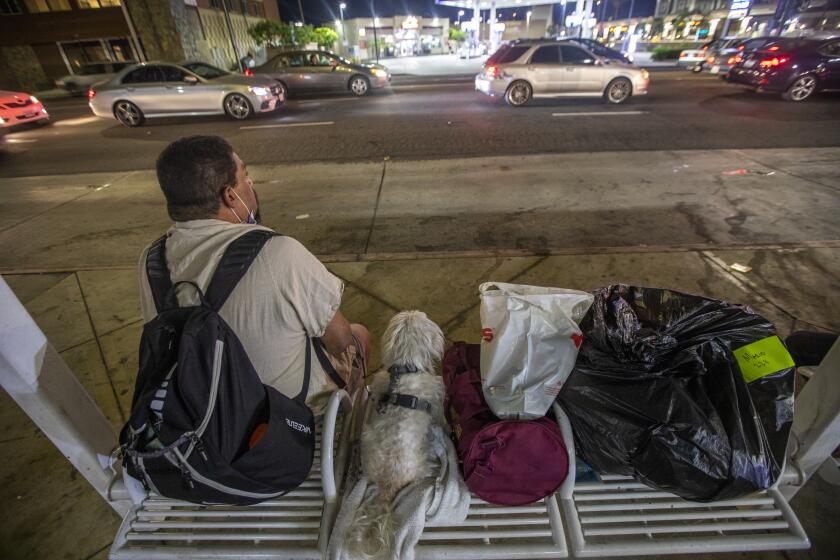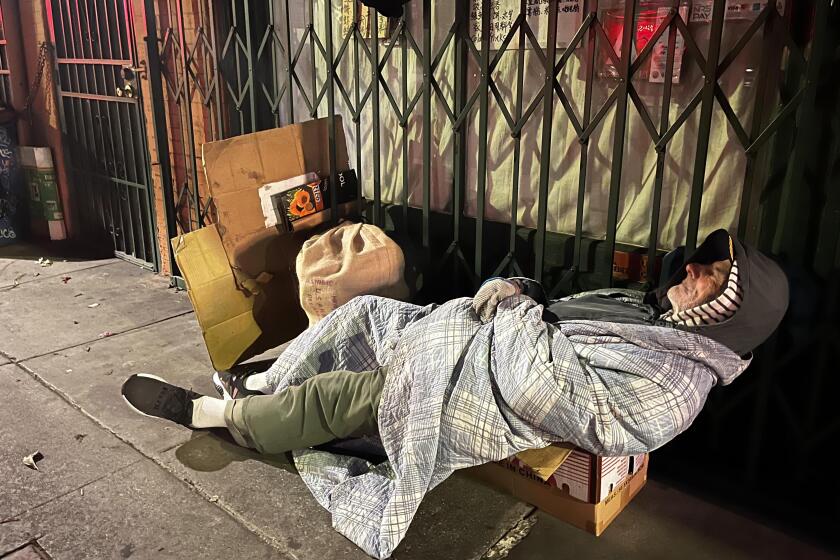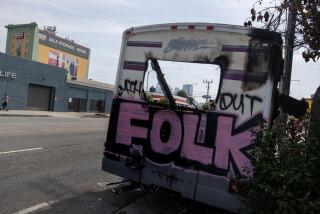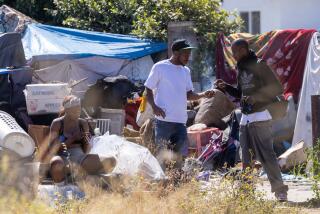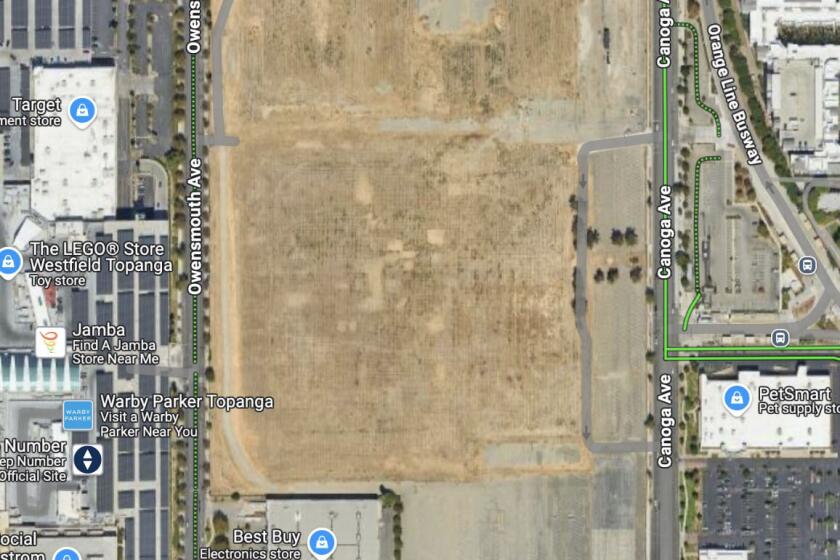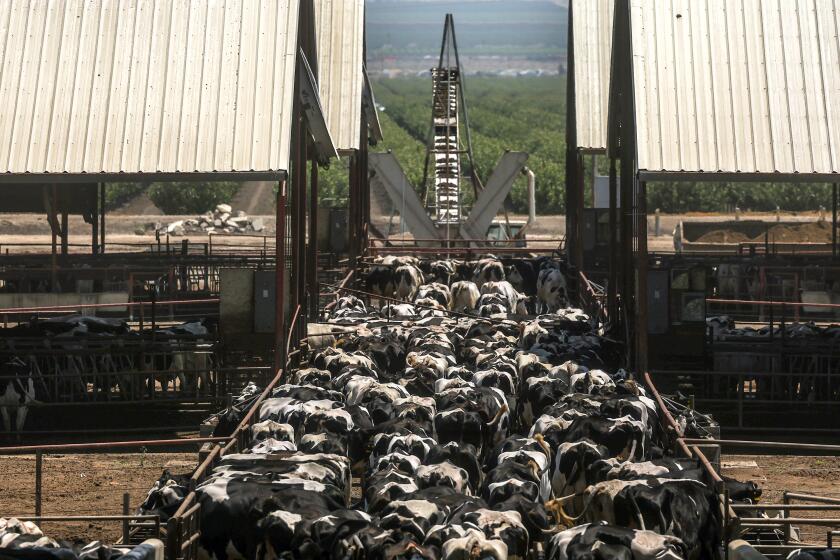Santa Monica to consider revising homeless ban to prohibit pillows and blankets outdoors

Homeless people in Santa Monica may soon be prohibited from sleeping outdoors as the city considers changing its anti-camping ordinance to comply with a recent U.S. Supreme Court ruling on the contentious topic.
The existing ordinance prohibits tents and makeshift shelters on public property. The revised ordinance would also prohibit the city’s unsheltered residents from using blankets, pillows and bedrolls while sleeping outside, exemptions that were added in 2022 to comply with a court of appeals ruling.
Santa Monica officials were expected to discuss the proposed ordinance along with other recommendations during Tuesday night’s City Council meeting, but officials postponed the item to be discussed possibly as early as next week.
Homeless people have long been drawn to Santa Monica, in particular to its promenade and beaches where tourists gather. They have been blamed for several headline-grabbing crimes.
Last summer, a man who appeared to be homeless assaulted Mayor Phil Brock on the Third Street Promenade. Brock was a council member at the time of the attack. This past May, a homeless man assaulted three people on the same street, stabbing at least two German tourists. The following month, Santa Monica police arrested a homeless man who attacked three people on the beach, including an elderly woman and a 17-year-old girl.
The city of Long Beach will begin citing and possibly arresting homeless people as part of its effort to crack down on the most problematic homeless encampments.
There are 774 people experiencing homelessness in Santa Monica, a 6% drop from 826 in 2023, according to the city’s recent homeless count. At least 62% of the unhoused population lives outdoors.
Tuesday’s proposed ordinance drew dozens of residents to the Santa Monica council chamber, some of them addressing the item at the start of the meeting.
Wade Kelly, a resident, told the council during public comment that he disagreed with the city’s plan to prohibit people from sleeping outdoors and directly addressed the mayor over it.
“You don’t stand for human rights,” Kelly told him.
Brock didn’t hesitate to respond back to his remarks.
“I am beholden to my residents, I am beholden to our business interests and I’m beholden to the people who need compassion on our street,” he said. “The question is, is [it] compassion to let people lay in our streets and die — I tend to say that’s neglect, not compassion.”
Some residents wrote to elected officials expressing their disapproval of the proposed ordinance; among them was resident Patricia Meyer.
“To simultaneously deny an unhoused person a blanket and an alternative place to sleep is both mean and absurd,” she wrote.
Kathleen Sheldon, a longtime resident, also wrote to officials, saying that preventing people from sleeping outside would not make the homeless problem disappear.
The region’s politicians have offered varying reactions to the decision, with some voicing relief and others worrying about an influx of homeless residents.
“It will simply expose desperate people with nowhere to go to even more inhumane conditions, further jeopardizing their health and safety and quite possibly their lives,” she wrote. “Please do not give in to the loudest and most hateful voices in our community. Instead, withdraw these cruel and counterproductive proposals and do what is best for our city.”
The proposed ordinance that was to be considered Tuesday night stems from a July City Council meeting in which Mayor Pro Tem Lana Negrete and Councilmember Oscar de la Torre asked city staff to “evaluate and provide options to amend the city’s municipal code” in order to comply with the recent U.S. Supreme Court ruling.
In June, the country’s high court overturned a ruling by the U.S. 9th Circuit Court of Appeals, known as the Grants Pass decision. That ruling said that camping and sleeping ordinances violate the 8th Amendment by constituting cruel and unusual punishment for people who had no other place to go.
The Supreme Court ruling to overturn the Grants Pass decision meant cities and counties were free to ban people from sleeping or camping on public property, even if there was no available place to go.
Shortly after that decision, Gov. Gavin Newsom directed state agencies to begin clearing homeless encampments from state lands; he urged cities and counties to do the same and threatened to take money away from cities and counties that did not make progress in clearing homeless camp sites.
Last week, the city of Long Beach began enforcing its anti-camping laws by giving police full discretion to issue citations and make arrests when necessary. City officials also sought to clear homeless encampments that posed a threat to public health and safety and prevented people from accessing libraries, parks and beaches. Authorities have also targeted encampments where people had been resistant to services.
In Los Angeles, elected officials said the governor’s order did not change anything in their approach to clearing encampments.
Although it’s unclear what elected officials plan to do in Santa Monica, city staff have also provided them with other recommendations, including taking no action. The city’s anti-camping law currently prohibits tents and makeshift shelters on public property but does allow people to use blankets and pillows while sleeping.
The Supreme Court’s ruling Friday gives cities in California and the West more authority to restrict homeless encampments on sidewalks and public property.
Staff also recommended that the city could wait and observe how other cities are approaching homeless encampments amid the Supreme Court ruling.
Tuesday’s controversial proposal also came on the same night that city officials were considering purchasing a commercial building on the 1400 block of Wilshire Boulevard to be used for a permanent supportive housing project.
Many residents who live around the proposed site showed up to speak out against the project, saying it would make their neighborhood more dangerous and less appealing to shoppers and would hurt businesses.
“We must do something to assist the unhoused,” Mary Stewart, an apartment owner, told the council. “This will actually not do much of anything but substantially damage the neighborhood for no benefit to anyone.”
She and many of the other residents said they would be OK with the project as long as the tenants were low-income seniors.
George Guttman echoed that sentiment, but also made an additional suggestion to city leaders.
“If you’re going to do low-income housing, hopefully you can put families there so they can go to our great school system.”
More to Read
Sign up for Essential California
The most important California stories and recommendations in your inbox every morning.
You may occasionally receive promotional content from the Los Angeles Times.
